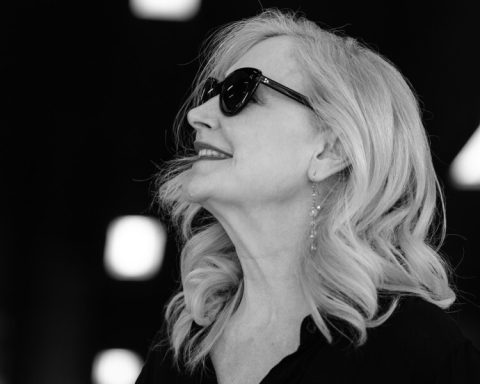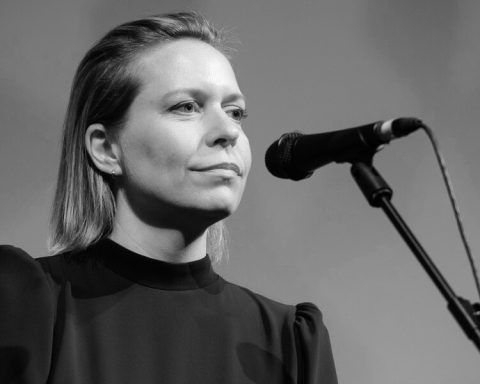A pioneer of Arab cinema, Dora Bouchoucha has produced numerous Tunisian and foreign feature films with her company Nomadis Images, including Red Satin, Les Secrets, A Tunisian Spring and Foreign Body by Raja Amari and Inhebbek Hedi by Mohamed Ben Attia who won the GWFF Best First Feature Award at the 2016 Berlinale. She created the Carthage Film Festival Workshop in 1992 and the Scriptwriting Development Workshop Sud Écriture in 1997. A member of CineMart, IFFR PRO’s co-production market’s Expert Committee for more than ten years, she helped bring numerous international projects into the spotlight. In 2010, she chaired the Fonds Sud and in 2012, the Aide aux Cinémas du Monde (CNC). But her most important role so far has possibly been that of Director of the Journées Cinématographiques de Carthage in 2008, 2010 and 2014. This year, she attended the Karlovy Vary International Film Festival, where she was a Crystal Globe Competition Jury member.
Bouchoucha didn’t set out to become a film producer. She has always been interested in literature. “I’ve always been very interested in literature. I studied literature. I love literature! I read a lot and even today, if you ask me to choose between a book and a film, I will always go straight for a book,” she says.
Bouchoucha started her career in film as a volunteer at the Carthage Film Festival, the oldest film festival in the Arab world. “It was for us a window into the world. I started as a translator for the members of the Jury and serving coffee so I could have an accreditation and be involved in the festival as a volunteer. It started like that. And I ended up being the director of the festival,” she recalls. She started reading scripts for other producers before adding workshop organization to her plethora of film related activities and achievements, “From the very beginning, my main interest was script. Afterwards, I started being involved in the organization of workshops, because in our region, there were so many producers who needed training to comprehend what a creative producer does. That’s how I got very involved in what is going in Africa and the Arab world,” she shares.
In that sense, she has been instrumental in the development of the film industry in Tunisia, and, by extension, the Arab world, “It was an amazing experience,” she reminisces.
In fact, she says Tunisian and Arab cinema started blossoming after the Arab Spring, “Young people felt free, not from the censorship, but more from the self-censorship. And when you have self-censorship, you’re not that close to the subject you want to reach the audience with. But since they no longer have that, they could reach the audience. They are more universal, and they’re very varied. And film has been professionalized because it wasn’t like that in the past. I think that lifting up the self-censorship helped a lot both the young generation and the older one, who could really navigate in times of the dictatorship, and was a little bit lost with the newfound freedom,” she illustrates.
When reading scripts, Bouchoucha likes to see innovation or an interesting point of view among other necessary qualities that are sure to rouse her interest, “And still, the content is maybe a bit messy, but at least in that messiness, you can find an innovative approach, a point of view that interests me, that touches me. There is no rule. I’m very happy because there are many very talented young people from the region now,” she elaborates.
She also laments the “lazy audience” trend that she saw spread like wildfire in cinemas, homes and at film festivals after reading many a script and being on several commissions, “The audience is lazy. They want something simple, explained, TV stuff. And sales agents and distributors, they tried. Then, we had blockbusters, but there was a moment where art films were really starting to open up to the world, but then you have all the platforms and everything is I always say ‘Netflixized’ and not ‘intelligent’ in the way that it makes the audience think,” she posits.
She adds: “Too many images, too much content, but no content at all.”
And, is she a feminist?
Most certainly! “I come from a normal, middle class, working family, but both my parents worked for the government. My father was the director of a hospital and my mother was a social worker. We were three girls and a boy and even though we were brought up the same way, you always heard my mother, even though she was a feminist for that period and that place, say ‘Boys don’t cry. You don’t cry.’ It stays [with you]. It happened that I went to a boys’ school and I did not really have any gender problem. There were very few girls among thousands of boys. I didn’t make any difference. It did mean that I didn’t feel like girl but, at the same time, there’s something interesting I would like to say: there are many gender issues in the region I come from. Tunisia is a bit of an example, which is quite apart because we had a President who actually fought for women’s rights, but it doesn’t surprise anyone in the Arab world to have women filmmakers, women gaffers, etc. The only question I got was, ‘Oh my God! You’re a producer!’ What is nice is that it doesn’t surprise anyone and people are paid the same. And not only in Tunisia, but in Egypt, Lebanon… and at least in that field. That’s not the problem we want to talk about,” she elucidates.
Photo credits: KVIFF.
This interview was conducted at the 2023 Karlovy Vary International Film Festival.










